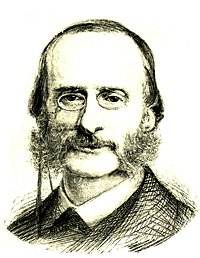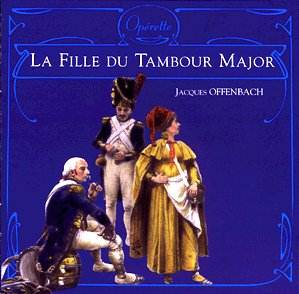
This recording is one of the rarer items
in the Accord Operette series and is
the only recording of the work available
complete; otherwise, only the six-minute
overture and one song can be found in
the current catalogue. One theme stands
out as being familiar; this was recycled
by Offenbach and reused from his Gaïté
Parisienne.
Accord's
vintage recording (made in the early
days of stereo) is very good and like
a number of recordings in this series,
the usual pit orchestra is replaced
by one of bigger proportions.
Little
is heard of La Fille de Tambour Major
nowadays probably because it is not
your run-of-the-mill Offenbach. Jacques
Offenbach premièred this work
at the Théâtre des Folies-Dramatique,
some fifteen years after the brilliant
reception given to La Belle Hélène
assured Offenbach of lasting popularity.
It is late Offenbach and followed
Madame Favart (1878) which, according
to Ganzl, was one of Britain's long-time
favourites, yet not even one British
recording exists. Despite a poor plot
not far removed from that of Donizetti's
Daughter of the Regiment, the
exciting music saved the work from failure.
This
is Offenbach set in French/Italian wartime
surroundings. In it the composer adopts
an unusually complex style for some
of the melody lines. Could thoughts
of Hoffmann (about to be written)
have been in his mind? A few of the
vocal numbers in Tambour Major
are quite taxing for the singers, but
luckily Decca had assembled a strong
principal cast for this 1962 recording,
and so nothing is lost.
Christiane
Harbell has an engaging velvety timbre
to her voice, and as daughter of the
Duke gives the necessary confidence
expected of her station. She carries
off the difficult aria, 'A vraiment,
je le déclare' with its unexpected
groups of semi-quavers with amazing
ease. Lieutenant Robert is given no
solo aria, but in his duet with Stella
he comes across with relaxed elegance.
Offenbach
has given the characters Claudine and
Griolet (a soldier) much prominence
in the operetta. As Claudine, Monique
de Pondeau shows that her light soprano
is versatile and well able to hold breezy
phrases with strong variation in dynamics.
Offenbach provides her with a rather
poor (donkey) aria with noisy ‘hee-haws'
echoed by the chorus. Despite its crudeness
she makes the most of the material [CD1
tk.5]. More pleasing is her ensemble
and duet with Griolet that follows [CD1
tks. 6, 10]. As Griolet, André
Mallabrera portrays the necessary strength
of character and sings his amorous Act
1 aria with dramatic tenderness and
good clarity [CD1 tk. 7].
Max
de Rieux's production with the performance
under Richard Blareau's direction is
polished. Some tricky orchestral phrases
are handed with ease by a large orchestra
that is clearly 'on the ball'.
The
recording is clear and well balanced,
with nice clarity to the singing.
Brief
notes in French are provided in an attractive
card case.
Raymond Walker
Operette
series from Universal Accord reviewed
by Ray Walker
